#Feminist ideological verification
Text



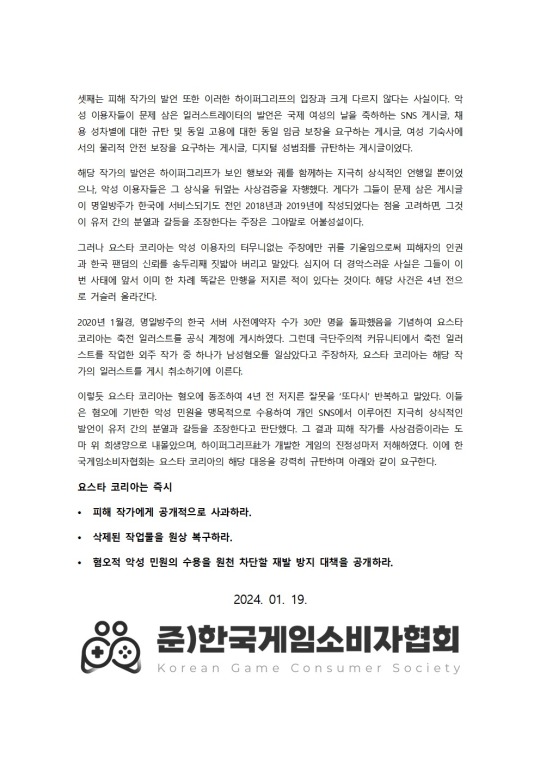
Statement document link
KGCS tweet link
#arknights#yostar#hypergryph#misogyny#korean game consumer society#Feminist ideological verification
170 notes
·
View notes
Text
I think now is a good time to advertise my craft server again now you all know I'm a crafty woman
A craft server for radfems
Must:
Be Female
Be 16+
Believe in radical feminist ideology
Be a crafter (just learning, beginner, advanced, expert, all welcome)
Have a discord and be willing to do the verification
Radfems, cryptos, radfem-adjacent/leaning are all welcome. The goal of this server is to be a community to women who craft. Hope to see some of you there and please dm me for a invite link <3
68 notes
·
View notes
Text
EQUAL RIGHTS IN ISLAM
According to Islam,God Almighty has given man this right of equality as a birthright. Therefore no man should be discriminated against on the ground of the colour of his skin, his place of birth, the race or the nation in which he was born.
Gender Equality in Islam
In gender equality conversations it is often insinuated that in Islam there is no gender equality.
The crux of Islamic teachings is that as men, we’re hardwired by nature and confirmed by divine design and historically through the ages to do three main things: to provide, to protect, and to lead. We do this not for our own sake, not to feed our egos, but in service to others; our families and society and country. Human beings are not identical units.
The fact that we are similar also means we are not the same. We’re not interchangeable pieces of social machinery. Equality is based not in political ideology but in the reality of the differences and mutual dependencies of real men and women. As men and women we are designed to need each other, not replicate each other. Because we have deviated from divine design and intent, it is the key reason why modern culture is so conflicted about equality of men and women.
In this article, I will explore some of the issues often raised and address the general question: Does Islam discriminate against women or men in its teachings? [*]
What is equality?
In order to understand this issue, we first have to determine what it really means to be equal? Are we talking about absolute equality when it comes to gender relations? If we are talking about absolute equality, it must be clear that many (perhaps, all) atheists, secularists, and feminists do not propose absolute equality of genders.
Virtually everyone concedes that the two genders need to be treated differently in at least some life activities. Take sports for instance. If absolute equality was the goal in sports, we would be having tournaments with men and women playing together or against each other. But this is not the case at all, as sex verification tests take place to ensure there is no inequality by having a man pretending to be a woman playing in a given sport.
Here, “equality” would be defined as women playing against women for a level-playing field. Had equality been absolute, such tests would not have existed. Their existence shows that all of us are agreed that nature has given different tendencies, aptitudes, strengths and personalities, to men and women.
Now, let us take a more specific example that is also related to sports: Physical strength. In this regard, it would be wrong to say that all men are stronger than women, but it would be correct to say that men in general are stronger than women, given that the term “strength” here is being used to refer to physiological, muscular strength and not to other kinds of strengths like dealing with trauma, surviving illness, etc. where women are in fact stronger.
Hence, if men entered into sports competitions against women, they would have an unfair advantage. The issue is not then one of gender equality in the absolute sense. Instead, it is an issue of gender equality in the best sense.
What that means is that it must be acknowledged that each gender has strengths and weaknesses that may or may not overlap. In certain respects, one gender has an advantage over the other, while in other respects, the other gender has the advantage.
As one psychiatrist, Dr. Neel Burton, puts it, “biological advantages and disadvantages are more or less equally distributed between the sexes”. In spite of these differences, God Almighty declares in the Holy Quran:
وَ مَنۡ یَّعۡمَلۡ مِنَ الصّٰلِحٰتِ مِنۡ ذَکَرٍ اَوۡ اُنۡثٰی وَ ہُوَ مُؤۡمِنٌ فَاُولٰٓئِکَ یَدۡخُلُوۡنَ الۡجَنَّۃَ ��َ لَا یُظۡلَمُوۡنَ نَقِیۡرًا
But whoso does good works, whether male or female, and is a believer, such shall enter Heaven, and shall not be wronged even as much as the little hollow in the back of a date-stone (Holy Qur’an 4:125).
In other words, as far as one’s spirituality and relationship with God is concerned, there is indeed absolute equality between the genders.
Understanding Gender Roles
What many see as inequality between the genders in Islam is actually equality in the best form. Due to the fact that women are born with the ability to give birth to children, and are naturally better equipped to care for a newborn’s needs, Islam has assigned them a more central role in terms of the upbringing of children.
This does not mean that men do not have any role in this regard. It only means that the father has a supportive role while the mother has the primary role and responsibility in taking care of young children.
Conversely, Islam assigns the role of supporting the family financially on the husband/father, and the husband bears the heavy responsibility of ensuring that the family is well taken care of. This is laid out in the following verse of the Holy Quran:
وَ لَہُنَّ مِثۡلُ الَّذِیۡ عَلَیۡہِنَّ بِالۡمَعۡرُوۡفِ ۪ وَ لِلرِّجَالِ عَلَیۡہِنَّ دَرَجَۃٌ ؕ وَ اللّٰہُ عَزِیۡزٌ حَکِیۡمٌ
The husband is responsible for providing all the needs and amenities for his wife”, clearly stated in the following section of a verse of the Holy Qur’an:
(Holy Qur’an, 2:234) وَ عَلَی الۡمَوۡلُوۡدِ لَہٗ رِزۡقُہُنَّ وَ کِسۡوَتُہُنَّ بِالۡمَعۡرُوۡفِ
While the man has been bestowed certain abilities that lay this responsibility on him, he is also taught to treat his wife with the utmost kindness.
The Holy Qur’an enjoins that if a man has given his wife a mountain of gold as a gesture of his affection and kindness, he is not supposed to take it back in case of divorce. This shows the respect and honour Islam gives to a woman; in fact, men are in certain respects like their servants. They have been commanded in the Holy Qur’an:
(Holy Qur’an, 4:20)وَ عَاشِرُوۡہُنَّ بِالۡمَعۡرُوۡفِ
i.e., consort with your wives in such a manner that every reasonable person can see how kind and gentle you are to your wife.
In other words, this teaching of Islam shows the tremendous amount of respect and dignity that is granted to women in Islam. In one way, the men are taught to be like servants of women. If anything, this teaching can be argued to have placed men at a disadvantage, a far cry from suggesting that women are being mistreated here.
In essence, Islam respects the different capacities and abilities of men and women, and provides them roles that are best suited for them.
The man’s role then is to be the breadwinner and provider of the family, while the woman’s role is to ensure the family unit is strengthened and children are brought up in the best environment.
These are the primary roles of men and women, which of course does not mean that their other roles should be completely dismissed.
As their primary roles are being fulfilled, women can work in a profession of their choice if they wish to earn a personal income. Similarly, men should play their part in the proper upbringing of children and providing their family the best treatment, as the Holy Prophet (SallAllahu ‘alaihi wa Sallam) said:
“The best among you is the one who is best in treatment of his family”
0 notes
Link

The success of today’s booming biometrics industry resides in its promise to rapidly measure an objective, truthful, and core identity from the surface of a human body, often for a mixture of commercial, state, and military interests. Yet, feminist communications scholar Shoshana Amielle Magnet has described this neoliberal enterprise as producing “a cage of information,” a form of policing, surveillance, and structural violence that is ableist, classist, homophobic, racist, sexist, and transphobic.
Biometric machines often fail to recognize non-normative, minoritarian persons, which makes such people vulnerable to discrimination, violence, and criminalization: Asian women’s hands fail to be legible to fingerprint devices; eyes with cataracts hinder iris scans; dark skin continues to be undetectable; and non-normative formations of age, gender, and race frequently fail successful detection. These examples illustrate that the abstract, surface calculations biometrics performs on the body are gross, harmful reductions.
A visual motif in biometric facial recognition is the minimal, colorful diagrams that visualize over the face for authentication, verification, and tracking purposes. These diagrams are a kind of abstraction gone bad, a visualization of the reduction of the human to a standardized, ideological diagram. When these diagrams are extracted from the humans they cover over, they appear as harsh and sharp incongruous structures; they are, in fact, digital portraits of dehumanization.
Face Cages is a dramatization of the abstract violence of the biometric diagram. In this installation and performance work, four queer artists, including micha cárdenas, Elle Mehrmand, Paul Mpagi Sepuya, and Zach Blas, generate biometric diagrams of their faces, which are then fabricated as three-dimensional metal objects, evoking a material resonance with handcuffs, prison bars, and torture devices used during the Medieval period and slavery in the United States. The metal face cages are then worn in endurance performances for video. Face Cages is presented as an installation that features the four performance videos and four metal face cages.
The computational biometric diagram, a supposedly perfect measuring and accounting of the face, once materialized as a physical object, transforms into a cage that does not easily fit the human head, that is extremely painful to wear. These cages exaggerate and perform the irreconcilability of the biometric diagram with the materiality of the human face itself–and the violence that occurs when the two are forced to coincide.
Digital Human, Series 18, Episode 6: Faceless
#digihuman#digital human#the digital human#digital human podcast#bbc radio 4#radio 4#radio#podcast#tech#technology#elizabeth ann duffy#kate bissell#aleks krotoski#zach blass#art#artist#art and technology#faceless#series 18#episode 6#face#privacy#human rights#protest#social media#facial recognition
3 notes
·
View notes
Note
How do you make sure you're not calling actual sex workers SWERFs for discussing negative experiences in the industry or problems with clients, or before going independent being trafficked? I follow several sex workers' decriminalization blogs and one of them who was abused by a particular porn studio gets called SWERF for calling out harmful industry practices or actions, if she doesn't identify herself as a FSSW first. How much background verification do you do?
I understand your concern and so I understand that the answer I’m about to give you may not fully satisfy you.
Part one of this answer is that identifying with a targetted marginalized group does not make you immune to their rhetoric. Having engaged in a variety of sex work communities and work between the two mods here, this is something we’re very aware of. It is not at all uncommon for sex workers in “more accepted” (relative to others obviously) types of sex work to use radical feminist talking points that throw “less accepted (again, relative to others) types of sex work under the bus, or that are unrelated to sex work but are still radical feminist talking points/rhetoric. Their usage of this language still matters and we hope that due to their potentially deeper understanding of the harm done by that language, they are receptive to being told when they have not been able to recognize it in themselves or others.
Part two of my answer is that we’re not calling any PERSON anything. We’re calling their rhetoric something. People are not rhetoric, they are merely the mechanism by which rhetoric is propogated in many cases. So a full service sex worker who engages in radical feminist rhetoric by denting the existence of and belittling nonbinary people, for example, would still be using radical feminist language even if they did not identify that way. I think it’s really important to remember a point we have discussed on this blog before which is intention versus impact. A person may not INTEND to repeat radical feminist talking points, but once they have done so, the IMPACT of that action on the other marginalized people around them and on the state of the conversation about social progress is the same. This doesn’t inherently make them bad people, and in fact many of them are specifically well intentioned it does however, make their blogs a place that is effectively unsafe for marginalized people who recognize and are harmed by that rhetoric. Contrary to popular wisdom, the creation of an unsafe space is not necessarily a purposeful thing and can often be done despite the best of intentions.
Part three of this answer is that we do substantial digging. We’re not looking for one or two solitary posts that we see bad rhetoric in. We’re looking for an overwhelming pattern of rhetorical propagation of radical feminist ideology. If a full service sex worker makes some posts venting about the industry without throwing other sex workers under the bus, that is not going to set off our radar, especially if we are not seeing any bbn other red flags popping up. I think people often respond to this blog as if we think each individual post discussed is undeniable proof of radical feminist rhetoric by itself. But we don’t. We are responding to substantial patterns of behavior and speech and there are often dozens or even hundreds more of similar posts to those we use for analysis on the person’s blog that we don’t bother linking to because, as I said, the individual posts are jot what is important. It’s the tone, dogwhistle words, and pattern of belittling or trivialization of marginalized identities and their needs that we are looking for because it is those things that tell us whether a person has been absorbing radical feminist talking points.
~~Mod D-Diamond~~
11 notes
·
View notes
Text
The Myth of Milo
The castle has come alive through all the battles that have been waged before its walls, the many storms it has stood in some life has seeped into its stone blocks. It’s alive it’s alive heat rising and lights beginning to glow ready to shatter at any moment from the sheer power. The castle, a force to be reckoned with towering over the land before it, but this great structure is under attack it has grown too strong, too massive and many seek to shake it down. Its might weapons have begun to feel the test of time, it has felt trembles that shatter windows and crack foundation. All this though it still stands and seeks to repair itself through some restructuring.
https://twitter.com/ReaganBattalion/status/833405993006616576?ref_src=twsrc%5Etfw
As of yesterday Milo Yiannopoulos has reportedly resigned from his position at the Breitbart News Network. This essay will focus primarily on what this all means for journalist as it relates to our current political moment and through criticism
Milo Yiannopoulos is an outspoken British journalist and now former Senior Editor for Breitbart. Milo first hit mainstream media as a commentator on the 2015 gaming journalism debacle known as Gamergate. Milo stood opposed to feminist critics and bloggers of the likes Anita Sarkeesian and Laci Green and as the scandal would die down we would begin to see less of Milo. It would not be until the following summer that we would hear of Milo again, this as a result of Twitter banning Milo from the site. For those who followed Milo up to his ban they would know that Milo had a rocky relationship with Twitter. The company had taken such actions of striping his verification and at one point suspending him only to ultimately reinstate him. Twitter hoped to make an example out of Milo for this ban given that he had a habit for antagonizing people on Twitter which would only cause a portion of his supporters to take that as a green light to harass them.
The specific incident in question was that of Leslie Jones, a cast member on Saturday Night Live and a lead on the recently released Ghostbusters (a major component of the criticism/harassment she had been getting). What had made this ban so controversial was that Milo was targeted not just for his audience but for what he stood for politically. Milo Yiannopoulos is a very loudly outspoken conservative and where there are those who are liberals in similar positions to Milo they are not banned but he is, Twitter also did a poor job handling the situation in not explaining the cause for the ban. As a result of this controversy would make it seem as though Milo was the victim in this scenario, some even heralding him a hero of free speech. This would do nothing but propel Milo into stardom landing him a book deal and putting more eyes on him than ever before.
Milo would go on to have a number of large public speaking gigs as well as big interviews, the most notable of which being his recent interview on Bill Maher and his scheduled speech as UC Berkeley which has ultimately resulted in a riot. This is off no cause of Milo’s own words or actions but of a peaceful protest that turned quickly into a deadly one. The speech would be cancelled before it could even start and Milo would have to be escorted off the premises for his own safety. This is another situation that would make liberals look like violent thugs that can’t have peaceful discussion and need to resort to violence. Milo is heralded once again as a near martyr and goes on to speak at other venues. Now don’t get me wrong Milo deserves all the credit he gets he is not only a good journalist even though a bias one, something which he does not shy away from he is a great public speaker backing up his views with facts and engaging his detractors with more grace than many of them show him. At times on the internet he does have a tendency to act of that of a troll in public he’s willing to hear out and debate with the other side without just shutting them down to further perpetuate his views.
Now within these last 48 hours Milo has come under fire for a number of remarks made on a podcast back in January where he talks about an experience in which he was 17 in a relationship with 29-year-old man. An experience by which he doesn’t as though he personally was taken advantage of but was actually taken care of. It is at this point that Milo begins to ride a fine line between victim and supporter of hebephilia. For those who don’t know is the sexual preference for early adolescent children between the ages of 11-14. The media in their portrayal of this story would show Milo as someone normalizing the idea of relationships between young boys and grown men. Milo would go onto combat these claims on his Facebook page defending himself. Blaming his own verbal slips up along with some deceptive editing as for the medias claim that he supports hebephilia. A quick disclaimer before I continue, I do not support what Milo said in or out of context, though I feel like his perspective on the matter in question is skewed by a situation in which he can be seen as a victim. That being in his history of having a relationship on a man way older than him as a young adult.
Now why is this so important you may ask, well as a conservative journalist Milo is a very important given the fact that he is gay. Where in many arguments that Milo’s conservative views are bigoted he avoids a lot of the identity politics issues just by his background. Milo is a myth that is not inherently constructed by the superstructure it is he has been cheered on by them. In our modern day an age as the number of straight white males in our country begins to take a decline and public opinions of both conservative and liberal ideologies begin to become more accepting of different minority groups the hierarchy must employ those who may not look just like them but take them in shaping and molding them into those that perpetuate their ideals. It is from this distinction that your Tomi Lahren as the conservative female voice against feminism, Milo as the gay conservative voice against liberal ideology, and so on and so forth. It is through this discourse of having a counter cultural identity that enables Milo to speak on subject by which other conservatives might be constrained from speaking on.
To better understand this concept of a person being formed into a mythology I refer to Roland Barthes. Roland a French literary philosopher and theorist who focused heavily on what he called “the false obvious” an implicit idea that supports that of the bourgeois. Where Milo may be contrary to what people expect him to be he is not the original myth but a cultural counterargument. In Cultural Theory and Popular Culture, the example of young boy black dressed as a French soldier saluting what is presumed to be the French flag. This example is a form of propaganda the importance of the boy’s race comes in as an underlining way in which to support imperialism. Showing that African in the same way that this boy has been conformed to French society so can they and it is to the it benefits not to their detriment. People are turned in propagandist symbols that perpetuate patriarchal ideology.
Though in being counter he still conforms to the norms of conservative society and perpetuates those ideas as a homosexual male. Now don’t get me wrong there is nothing wrong with the idea of a conservative homosexual is a bad thing I herald Milo and those like him. As Americans we no matter what our background have right to believe what we choose. It is just important to note the way in which conservative society wants to present him as a poster boy for conformity. In an attempt to ensure that the ideals of the hierarchy maintain themselves it must adapt. New exceptions must be made our future conservative will not look the same way we imagine them today.
The power is not within the hands of Milo though his position has given him a level of autonomy within the right-wing community. This is an action that can be made on both sides though on the liberal side of things it is a lot less obvious. What will often occur is that certain groups are made out to be more important than others given that in many circumstances they may be marginalized or oppressed. This does nothing but patronize these people and further ostracizing them from the group. His use a conservative symbol for tolerance show his importance in journalism as it relates to the political spectrum but there is still more to this story.
As this year has progressed it has seemed that new reporting has gotten sloppier and lazier when it should be adapting to our current situation and becoming adapters. This defamation of Milo’s character as a way to discredit him is ultimately going to be a journalistic failure. Given Milo’s ties to Breitbart and Breitbart’s ties to the Trump administration this has been an effective journalistic low blow. Though low blows only show how weak the attacker is and assume to much strength from those being attacked. In furthering my point, I direct you to structuralist Ferdinand de Saussure and poststructuralist Michel Foucault.
The Mainstream Media or MSM has used decisive language as a way to discredit Milo using his own words against him and employing powerful labels onto him such as pedophile. It is a word so horrendous that the idea of being even compared to someone of that nature is anyone’s worst nightmare. In this way Milo has been marginalized by the public and many of his supporters have jumped shipped in efforts not to be presumed as pedophiles themselves or supporters of a presumed pedophile. The use of a fallacy such as the Ad Hominem fallacy used here only shows weakness in facing Milo on his own terms showing that those who do so can’t result to the tactics of calling him a bigot rather actual presenting flaws in his argument with facts not fallacies. The major mistake being made is in the lack of factual evidence, though Milo may have some warped views on the consent and how old person should be to consent to sex, actions wise he has done nothing wrong and until the rumor mill can drum up allegation of Milo committing acts of pedophilia this whole thing will ultimately been seen a slander campaign by liberals as a way to make conservatives out to be something they aren’t. This whole situation shows the major impact our system of language can have on a situation. If the right words are employed, it can make for a very damaging attack though not a lethal one.
This is where I lead you to Foucault. Foucault’s theories focus primarily between the relationship between knowledge and power and at the current moment conservatives hold majority political and public power. This caused by two things our current political administration, something that is out of the typical journalist control but what is in their control is journalist ability to use factual evidence as a way to debunk and disprove detractors. Though this is cry often falls on death ears, knowledge itself is not power but knowledge gives one access to power. The moment when a conservative or liberal makes a fool out of someone by having a more nuanced understanding of the subject at hand. This prowess makes out one sides argument to be weak an ultimately make it seem wrong. Where ultimately neither side is completely write or wrong so it is often two adept communicators may find themselves arguing around each other. The discourse of their political perspectives has constrained them from speaking on certain issues because it requires a less biased perspective to be able to wrap your head around.
What comes of this in the end is the further separation of the left and right politically and ideologically creating an inability for debate or discussion where both sides seek to discredit the other rather than ignore binary oppositions and approach each other’s arguments on common ground which is detrimental to the medium of journalism.
#journalism#Structuralism#post-structuralism#Foucault#roland barthes#ferdinand de saussure#milo yiannopoulos
2 notes
·
View notes
Text
No Man Is An Island: Navigating the Female Colonist
“No man is an island entire of itself; every man
is a piece of the continent, a part of the main;
if a clod be washed away by the sea, Europe
is the less, as well as if a promontory were, as
well as any manner of thy friends or of thine
own were; any man's death diminishes me,
because I am involved in mankind.
And therefore never send to know for whom
the bell tolls; it tolls for thee.” (Donne 98)
Does woman not have the potential to be an island ‘entire of itself’? In reading Donne’s poem literally, it appears to encapsulate the flaws of men and suggests the man is ‘involved’ within ‘death’, engaging with a conventional reading of colonialism. However, a feminist reading of the poem, similar to Coetzee’s refashioning of Robinson Crusoe, allows a transcendence into liberal modernity. Herein I infer that deconstructing Donne’s text through a feminist lens designates that the female may surpass the male: capable of individualism. The female form ultimately provides, sustains and nourishes human life; it is the basis upon which the very existence of creation is possible. However, Coetzee’s decision to transfigure a male colonist into a female subverts the very notion of the stereotypical subservient, maternal and kind female when she develops the detrimental qualities of a colonist. For western colonialism surpassed the liminality of space, to invade metaphysical and psychological spaces of degradation such as causing epidermalization complexes across variances of skin colour. Foe aims the blur the metaphysical notions of gender through the trajectory of identity. Initially a strong and independent feminist character, Susan Barton rejects Cruso’s patriarchal overtones such as “while you live under my roof you will do as I instruct!” (Coetzee 20). Such utterings are highly both childish and controlling, and perhaps we despair for Barton as she transgresses this strange and impossible land. Yet this phrase simultaneously injects bleak humour, as the sexist narrative extends even to desolate islands where ‘roofs’ are fictitious. However, indoctrinated by England’s imperialistic views, Susan’s morality is undermined by her immediate reference to Friday as her “porter” (Coetzee 8) as an offhanded remark. This language is contemptible and dismissive, yet how can we blame a woman embroiled in a regime conceived by the patriarchy? Despite her initial strength to rebel against Cruso’s authority, Susan acclimatises and conforms to become “his second subject” (Coetzee 11) - no longer colonist, but colonised within Cruso’s phallocentric fairyland. It is important to observe she remains authoritarian to Friday. She is, after all, the middle ground between the two. Hindered by her gender, she is ameliorated from a position of despair by her whiteness. Subsequent to Cruso’s demise, Susan importantly internalises his narrative and identity to become Friday’s new master. She becomes a hybrid form as a female possessing a male narrative. This is Coetzee’s plaything, his game, as he challenges his readers to conceptualise new reactions to imperialistic custom.
We observe a cataclysm of feminist discourse present within the text. While Barton possesses a female form, her ideological processes are inherently male-driven following her experience upon Cruso’s island. Are male and female psyches under colonist circumstances disparate? Or is gender negligible under the circumstances of white imperialism? In deconstructing a male author’s text, a reader must probe into whether Coetzee is capable of writing a female character adequately without prejudice or imbuing her narrative with masculine characteristics. This parallels a convoluted past, with a wide-ranging report of critique of his previous work. After all, in an interview, Coetzee revealed that his “sympathies in the novel were clearly with “Foe’s foe, the unsuccessful author – worse, authoress, Susan Barton" (Atwell 112). Coetzee posits himself as an ally of Susan Barton, yet his writing does not enhance her character, she is somewhat repugnant. Placing a female ‘authoress as ‘worse’ similarly sparks large implications. Coetzee participating in the sexist commentary, denouncing his position of female authors is an immediate flag that perhaps this is not a narrative that can be trusted. Given this, the novel begins shipwrecked between quotation marks. To quote something is to be given agency over it, to alter titbits of narrative similarly as Barton does unto Cruso. Yet while we resultantly expect the narrative of part 1 to be from Barton’s perspective, it is not until part 3 of the novel that we manage to escape the quotation marks. To truly access Barton. The quotation marks could either represent what Barton has retold of her story, or they could be a sign of something incessantly sinister. The words may be elusive, as her narrative, through the lens of Foe has been adapted to his ideal narrative. There is no incertitude that he wishes to inject Susan’s tale with flair, as he wishes for “cannibals and pirates” (Coetzee 121) to enter the story and monetize the narrative. Susan, in contention, breaks the 4th wall within literature. She recognises that “Friday has no command of words and therefore no defence against being re-shaped day to day in conformity with the desires of others. I say he is a cannibal and he becomes a cannibal” (Coetzee 121) This is a binary of self-awareness. Susan’s quote summarises the entire systematic approach of novelisation. She, as a character, is at mercy to the expedient influence of both Foe and Coetzee in having the necessitated power to modify her tale. It is furthermore a fantastic if not forlorn reflection upon the state of slavery. In reality, let alone literature, as soon as someone is allowed to alter your narrative, it is almost as if they own you. The power of self-agency is the only modem that prevents non-fiction from transgressing into fiction. As soon as this is destroyed, or colonised upon, individualism is defunct. In lieu of this, Coetzee’s quote could be read as pragmatically sensible, in the recognition that literature is a male-dominated field, and that a female author would be more harshly critiqued. Examples of this are not localised to postcolonial literature such as Foe, the reality of this statement is widespread within literature. Charlotte Bronte poignantly surmises the problem of the ‘authoress’:
“We did not like to declare ourselves women, because – without at the time suspecting that our mode of writing and thinking was not what is called ‘feminine’ – we had a vague impression that authoresses are liable to be looked on with prejudice” (Gaskell 265)
The death of female agency within literature is a terrifying concept. This event is witnessed through the Bronte sister’s lamentations, through Daniel Foe publishing Susan’s story, through the twenty-first century as novelists continue to produce stunning literary works under the pseudonym of a male. To declare oneself as ‘woman’ is difficult because, through divergence from the ‘feminine’ path, there is ‘prejudice’. Clearly, to posit oneself as an ‘authoress’ is problematic, as Coetzee places Barton in opposition to Foe as his literal foe. Wherein is the source of such antagonism? While they collide on a multitude of points, the repetitive copulation, and eventually marriage of Barton to Foe implies a subversion of a foe. Yet, perhaps, this is a verification of the lack of agency permitted to a female. In order to achieve her goal of having her novel published, Barton’s only option is to marry Foe and allow him to inscribe upon her his masculinity. Perhaps Barton’s character cannot possess the slightest modem of femininity, as her genesis is inherently patriarchal, proving Spivak’s point that gender consistently fortifies the male as the dominant figure. To navigate the female colonist is to ultimately shipwreck one’s feminist integrity: as long as the patriarchy is enforced, the woman cannot ever truly be colonist – an eternal subaltern to the reign of man.
Women are cogs in the imperialistic murder machine – they remain subjugated to the male, as “the ideological construction of gender keeps the male dominant.” (Gillen 185). Women exist behind the scenes, staying at home, caring for the children and conducting a variety of sexist practices that exist, even within our present century. This is proof in itself that this ideological ‘construction’ is incredibly effective. Backdating the patriarchy, its conception is pre-history. However, even looking at the original narrative of the hunter/gatherer duality as men/female respectively, there is a clear deviance in power. Perhaps we can almost declare any spatiality, even the Eastern world, before colonisation to be abjectly fortunate compared to a woman trapped in the western topography. These societies, before their dissolution by imperialistic notions, had the potential to be free of wrongdoing. If any problem is to keep arising throughout history, it is that the male figure within itself is inherently problematic. Spivak states: “If in the context of colonial production, the subaltern has no history and cannot speak, the subaltern as female is even more deeply in shadow” (Spivak 82). Dovey’s argument eloquently supplements Spivak’s idea:
“From a political perspective, there are interesting parallels between the feminist problem of a women's language and the recurring 'language issue' in the general history of decolonization", she goes on to say that despite its unifying appeal, the concept of a women's language is riddled with difficulties. Unlike Welsh, Breton, Swahili, or Amharic, that is, languages of minority or colonized groups, there is no mother tongue, no genderlect spoken by the female population in a society, which differs significantly from the dominant language.” (Dovey 82)
A woman’s language is nondescript: it does not exist. Even languages, despite the fact we refer to basal languages as ‘mother tongues’, are rife with the effect of male influence. To follow on from Spivak’s point, with the exemption of Friday as he is mute, even the colonised subalterns retain a position above the female within linguistics. Females are appropriated to a linguistic liminality that demotes our position within society not by the colour of our skin, or our ethnicity, but by the genitalia we are prescribed from birth. One could argue with Dovey that women do have a shared language – of certain movements, or of the stereotypically private girly chats that have existed for years outside of the male eye due to their necessity. We must inhibit a sacred place of femininity if not only for our sanity.
However, I think it is important to question as to why, as a largely hegemonized group for centuries, women have not banded to form a language. In relation to colonisation, I believe it is the motivational force of fear. To rebel against the male narrative in a world such as our own is a betrayal. To deny a man is to betray. To stray into a space that cannot be occupied by the cis heteronormative sphere is to inhabit a place in which a female, due to breaking the ‘rules’ of heteronormativity, must be afraid. As a result of this, perhaps we can never blame Susan Barton for all her injustices – even within the languages she uses within her internal monologue, she is constantly voicing the language taught to her by men. One must resultantly decipher the white imperialist through the dialogue of Franz Fanon’s Black Skin, White Masks and his critique of euro centralised imperialism and epidermalization. Yet even such a concise and fluent condemnation is vitiated, marred by Fanon’s cultural stereotype of the white female.
Fanon proactively points out that “the white man is the predestined master of his world” (Fanon XVI). While Fanon’s statement is honest in the perception of the necessitation of power within a male sphere, the use of ‘predestined’ is alarming as a word imbued with power, and involving the idea of predestination almost absolves the white male of the blame. After all, if it is predestined, it is meant to be. And how, then, is a woman meant to possess tract, be the ‘master’ of her own existence? While sexist in disallowing female agency, one must acquiesce the reality of the chauvinist narrative of society. It is interesting to note that the direct opposition of this society is the black female, posited against a racist and sexist regime. A figure who is directly and most severely affected by the conditions imposed within such a political sphere. What if Susan Barton was black, and perhaps it was Friday who had washed ashore upon Cruso’s isle as a white man? The narrative would be vastly different and abjectly more violent, no audience can negate this. However, Fanon goes further to claim that “A given society is racist or it is not (Fanon 63)”. This statement is true, yet more complex than Fanon proposes. While a society is or is not racist, it is necessary to provide rationality for this notion. A society is not ‘predestined’ to be racist. Rather, it is racist because of how it is taught, similarly as a child may be raised aggressively. Racism, alongside sexism, homophobia and all matters of evil are not passed through the centuries via blood, they sparked by the internalised systematic oppression that infiltrates society: these behaviours are taught. The predominant sociological structure since the conception of the known order has been patriarchal. Our blame for a racist society can subsequently be ‘predestined’ then upon the ‘master’. I do not mean to absolve the female gender for their applications of oppression, merely to imply that their racism is a secondary effect of what has been taught down by society.
Dovey states that Susan Barton's story “is the story of a woman seeking to authorise her own representation: she challenges the authority of existing representations, and wishes to be recognised as the author of her own speech’” (Dovey 122). However, Barton cannot authorise her own representation, as it is not her own. She steals Cruso’s story, identity, and slave, she inhabits his narrative to the point where she begins to falsify and invent narratives. She creates an ‘old’ Friday, who is ‘a savage among savages’ (Coetzee 95). Friday’s body language, his eating habits, his entire practice of never one insinuating cannibalistic behaviour. However, in colonising over his own narrative as he lacks linguistic agency, Barton can propel herself into mystique with her colourful tale. Despite her repetition of her ‘love’ of Cruso, she seems to continuously berate him once he is unable to argue with her forthcoming. Instead of slavers, Cruso is suddenly at blame for the removal of Friday’s oral appendage. Why? For her own selfish imperialistic value. Her rare opportunity to propel herself without limitation. While it is not her own representation, she is certainly the author. This is the juncture where Barton is not only provided with speech but moreover free speech and artistic reign. The narrative she provides is not limited by patriarchal values, but society is multifariously flawed. Capitalism and vanity thus anchor and provoke Susan towards a narrative in which she is inherently and irrevocably flawed and the ‘truth’ of narrative to profit such apparatus. It is when Barton recognises a threat to this modem of representation that her behaviour becomes incredibly erratic. As ‘master’ of Friday, she is unable to allow him to begin to create his own fate.
“Give! Give me the slate, Friday!’ I commanded. Whereupon, instead of obeying me, Friday put three fingers into his mouth and wet them with spittle and rubbed the slate clean. I drew back in disgust. ‘Me Foe, I must have my freedom!’ I cried. ‘It is becoming more than I can bear! It is worse than the island! He is like the old man of the river” (Coetzee 147)
Friday is not regaining language within this scene, but rather drawing ‘row upon row of eyes upon feet: walking eyes’ (Coetzee 147). The imagery of walking feet is difficult to decipher, but there is a multitude of possibilities. Perhaps these are not eyes, but rather manacles that encircle the illustrated feet. This would undoubtedly unsettle Susan who enjoys pretending that she a glorified, sinless leader of Friday. Referring to an earlier scene she states, ‘I have written a deed granting Friday his freedom…’ yet she immediately refers to their scenario, she is “the barefoot woman in breeches… [with] her black slave” (Coetzee 99). Susan argues that she does not own Friday, yet the inflexion of ‘her black slave’ demystifies this notion. He is ‘hers’, and more important, he is a ‘slave’. The subversion of this, playing Barton as the slave to Friday, throws the narrative off course. “I am wasting my life on you, Friday, on you and your foolish story…a great waste of time” (Coetzee 70) She informs the reader that her “principal words” for Friday are “watch” and “do” (Coetzee 56). These are not words of leniency but words of direct commandment. The idea of Barton ‘wasting her life’ upon Friday resultantly lacks all coherency. She does not offer him any great favours, exemplified within the laughable scene in which she offers him to ‘return’ to his native land. She notes “all was not as it seemed” (Coetzee 110) between two men are who presumably slave traders. Even if they were not, this is Susan naively offering free merchandise. If Friday did manage to navigate the sea, his presumptive fate would be a replication of events, minus a shipwreck and an island in which he is cared for.
The ‘scheme’ of slavery is so rife that upon denial, the captain merely ‘shrugged’ upon the denial of Friday’s body. When one can capitalise upon an entire race, who cares about a ‘piece of the continent’.
We must further delve, or swim towards the shipwreck of Susan Barton’s character as a perplexing anomaly. Despite having a daughter, a husband is never mentioned, elevating her to an idolatrous feminist figure. Assuming Foe is set directly within Robinson Crusoe’s 1700s narrative, Susan is a ground-breaking persona, a prototype for single mothers. Consequentially, she is the anti-thesis to Donne’s meditations. An anti-individualist, she is not wedlocked nor is she landlocked within her initial narrative form. She transverses between Bahia, ships, and islands obfuscated in the topography of time and spatiality. This allows her to adopt the anti-maternal trope of “British Victorian adventure heroes… [who are] objects of desire” (Phillips 116). Phillip’s quote glorifies the colonial hierarchy yet excludes feminine discourse, the term ‘desire’ is curious via the reality of sour abhorrence. Men raping scores of subordinate women in developing territories is neither ‘heroic’ nor ‘desirable’. The superfluous nature of the male ego, implying that the female sexual appetite is depraved to physical assault is deplorable, and Cruso is certainly not an object of desire within Foe. Barton’s inaugural relationship with Cruso is nongregarious, and she is moreover physically repulsed by Friday, treating him with “distaste” (Coetzee 24). The archetypal, lascivious allegory of the exotic male traveller is thus tousled by Coetzee’s narrative style which exudes a near asexual style. However, Coetzee plays with this trope, as Susan is certainly an ‘object of desire’. Besides the captain of the rescue ship, she fornicates with all straight characters beyond Friday. Given this, each of her sexual encounters transforms the bedroom narrative into an interesting mise-en-scène of dominance, as she insists on being on top of the male. Susan must ‘coax’ Foe in particular, which “he did not seem easy with, in a woman” (Coetzee 139). The deliberate inclusion of ‘woman’ is intentionally confusing. Is sexism so ingrained into the male psyche that any form of authority exercised by a female is uncomfortable? Or is the Victorian period perhaps so prude that any deviation from the missionary position is shocking? Or, ultimately, is Coetzee insinuating that it would be ‘easier’ for Mr Foe to stomach a man sexually dominating his body? After all, “Coetzee, rather than following the easy path of repetition and conformity, ran risks and ignored sensibilities” (Attridge X). In deliberate rejection of ‘conformity’, this postmodern text is certainly aiming to unsettle the reader. Coetzee does not wish for us to have an ‘easy path of repetition’ but rather to play games. The proof materialises as the reader can picture this exchange almost as Susan taking Foe’s virginity through her ‘coaxing’ in a (perhaps psychologically painful) ‘first-time’ experience for him. Herein Susan is sexually deviant, the strong imperialistic native from Cruso’s Island. The implications are confused for Foe: she is meant to be a subordinate female, a visually white equal, yet she is simultaneously an exotic and authoritarian figure, transfigured via her experience on Cruso’s island. From her experiences, away from sheltered Victorian England, she is a hybridity of male and female that is alarming to the sequestered Foe. Yet intercourse with Cruso is substantially different. There is no resistance, rather Susan strokes ‘his body with my thighs’ (Coetzee 44) in language that is tender yet still positions her as the leading force. Despite this, Cruso does not defy her, nor require ‘coaxing’. Cruso has already dominated Barton’s narrative. An example of this appears later in the novel, when Barton discovers a stillborn infant upon the side of the road and panics that Friday may consume the child. She recognises that this behaviour is inherently inappropriate, that she did Friday ‘wrong’ to think in such a manner, but ‘Cruso had planted the seed’ (Coetzee 106). From the point of Cruso’s demise, he has planted an entire gardens worth of seeds within Barton’s mind considering the frequency with which she refers back to him. She has subsumed his narrative into her own, developed his sexual appetite. Her first copulation with Cruso reads as a sexual assault. She pushes him away, yet ‘he held me’ and ‘I resisted no more’ and ‘sat down to collect myself’ (Coetzee 30). The language herein is not of a positive sexual experience but rather a regretful surrender. The implication that she resisted is a conventional rape narrative. While Cruso can and has no qualms in commandeering her body,
Susan is not a sexual threat due to her existence as a female. This is due to the fact Barton fails to possess a penis, with which to psychologically and physically berate her ‘subjects’ as a ‘master’. While a female is certainly capable of physical assault (whether first or second hand, such as through an accomplice) perhaps the female colonist is limited by physicality. Without the potential to sexually conquer through the invasive and demoralising act of penetrative rape, perhaps the complete dehumanisation of an intended subordinate is impossible without the phallus. The androcentric regime of domination will triumph in degradative consequences, and thus the woman colonist may never be as carnally tumultuous.
While Susan may colonise Friday in a multitude of ways, she does not sexually engage him. Barton is, however, certainly fascinated by Friday’s priapic distance. Dovey notes Friday’s “absent penis/tongue allows him to figure as the phallus for Susan Barton as woman writer; he becomes a fetishized phallus" (Dovey 127). Does Barton fetishize Friday? Her physical repulsion due to his muteness denies this theory. The conjecture of penis/tongue is covertly sexual as two objects of an erotic appendage, two ‘promontory’ parts ‘of the main’, yet what is the effect if Friday lacks both addendums? He is feminised, easier to control, and moreover becomes not an object of desire, but rather an object of apathy on which to project her own insecurities. Barton even reaffirms in a weirdly covertly sexual scene with Friday she ‘does not mean to court’ him. She speaks of kissing ‘cold statues of kings and queens’ and of “marble” and of the “dead” (Coetzee 79) – if this is the language of courtship, it is certainly a unique approach. This is a woman speaking to her slave, as she proffers a self-confessed ‘long, issueless colloquial’ (Coetzee 79). Her speech is patronising, demeaning, and moreover complete gibberish to Friday. ‘Marble’ immediately segregates Friday as it infers Susan’s preference for a white man. The conjunction of ‘cold/marble/dead’ moreover paints a morbid picture that suggests necrophilia tendencies. Perhaps, embroiled in a daydream and lost in her ‘issueless’ spiel of words, ‘she envisions her ‘dead’ Cruso. If Friday could understand Susan’s drivel, it would formulate an incredibly complicated sexual legacy for Friday. After all, “in every case, the language and the consciousness through which the servant’s world is mediated is the masters” (Attridge 17). While this would perhaps resonate if Friday listened to Barton, he seems entirely distant from her. He seems to do the bare minimum, not to please her, but merely in an act of self-preservation as he does not know where to go next. Friday is trapped on the English isle, only slave to Barton due to his lack of having elsewhere to go, subject to Barton’s will.
It is almost as if Susan externalises a maternal prowess over him. Perhaps it is less colonialism and more her desire to probe into Friday’s truth, to find some variable of language that will allow spatiality for his narrative. More so than her own narrative, she is near obsessive for Friday’s tale. She does not, thus, fetishize his phallus, but rather his tongue. I explain this by a regression to Cruso’s island. Throughout the narrative, the few words Friday has been taught are ‘as many as he needs’ (Coetzee 21). The words he knows are not complex, yet perhaps this is the language of colonisation: minimal linguistics. Short, commanding words that convey a direct message. This is experienced when Cruso teaches Friday to ‘open his mouth’ (Coetzee 22). This is a forceful and incredibly invasive procedure, especially when aware of Friday’s lack of tongue. The ‘dark’ (Coetzee 22) is a metaphor for the language of colonisation itself through the primary example of the colonised – Friday, as a slave, will never be able to vocalise his narrative. Instead, his rhetoric and his heirloom of colonisation is the language that Cruso bestowed upon him. Europeanism is thus implanted within Friday, governing his actions despite the fact he cannot comprehend it. Barton’s reaction to this intimate encounter is incredibly maternal. Knapman notes the discretions between the treatment of slaves across variations within gender.
“Instead, through their kindness, benevolence, and reliance on moral suasion rather than force, white women made racial tolerance, if not racial equality, the hallmark of their relations with non-Europeans. It was the European male who stood with whip in hand over his black labourers, not the European woman” (Knapman 107)
Barton, despite her flaws, could arguably be said to want Friday to be free. Although, perhaps this is for her own self-gain. Friday is nothing but help to Susan, yet she seems to consider him a burden upon her life. Upon Cruso’s Island they stand within equality, yet being passed the baton of ownership divulges her towards a loss. Her ‘moral suasion rather than force’ invites an uneasy narrative wherein she simply berates Friday. There is no affection towards him, in fact, she only seems to truly care for Friday once in the lens of Foe. In a position where she is under scrutiny and there is the potential impact upon her narrative, she behaves as she wishes her ‘people’ to view her. Unfortunately, the narrative that Susan provides for herself is flawed. She treats Friday unjustly despite his lack of choice. He is a direct threat to the narrative she has stolen, adapted, metamorphosed into a wonderful and exotic tale when perhaps it is a great tragedy. She appropriates him in every way conceivable.
While this essay is about feminism and colonisation; their modalities are the same. Two systems of power oppressed by the same force: the heteronormativity of the white patriarch as ‘master’, ‘predestined’ to ‘shipwreck’ us forevermore. Society, nor gender, are staticised forms. A female colonist under the influence of a patriarchal society is, unfortunately, nearly as detrimental as a male herself in the metaphysical repetition of the narrative. However, the female form is limited within physicality, especially within a sexual context due to lack of phallic commandment. A woman’s morality and ethics, her attitude, within such a society are proscribed from the lessons learnt from birth. We discover retribution through forms of ‘moral suasion rather than force’ as a result, but what if a female genderlect was introduced? Through subscribing to rhetoric based upon ‘morality’ and of a ‘unifying appeal’, could this matriarchal sect not introduce intersection? To eliminate racism, to redefine the very definition of a ‘colonist’. Not as commander of another’s body, nor narrative, but to make advances towards inclusivity for all towards equality. Mr Foe states, ‘the island is not a story in itself’ (Coetzee 117). Not is the conception a colonist that of a colonist – shifting registries of meaning allows for change, to transcribe detriment into delight. Yet while such inscriptions and liminality upon reform exist, we can answer Spivak’s essay: Can the Subaltern Speak? The answer is fundamentally and eternally a resounding no. Female or black, tongue or not, to enact subordination is to eradicate a voice entirely. For perhaps one could argue there is nothing more subordinate than the female, as ‘the relationship between woman and silence can be plotted by women themselves; race and class differences are subsumed under that charge’ (Spivak 82). Barton is only obsessed with the narrative of Friday as male because she has no claim to a voice. In providing Friday’s voice, she validates her own, as she splutters, swimming toward the island, away from the shipwreck of her tragic noiselessness. The horror of the darkness in Friday’s throat, where the tongue should belong, is not her empathy for Friday: it is the self-realisation of her position of a woman, where the tongue shall never belong, lost in the devastation of the wreck.
Works cited
• Attridge, Derek. J.M. Coetzee and the Ethics of Reading: Literature in the Event. Scottsville: University of KwaZulu-Natal Press, 2005. Print.
• Attwell, David. J. M. Coetzee: South Africa and the Politics of Writing. California: University of California Press, 1993. Print.
• Coetzee, J. M. Foe. Harmondsworth: Penguin, 1988. Print.
• Donne, John, and John Sparrow. Devotions upon Emergent Occasions. Cambridge: Cambridge UP, 2015. Print.
• Dovey, Teresa. "The Intersection of Postmodern, Postcolonial and Feminist Discourse in J.M. Coetzee's Foe." Journal of Literary Studies 5.2 (1989): 119-33. Web. 23 Dec. 2017.
• Fanon, Frantz. Black skin, white masks. London: Pluto, 2008. Print.
• Gaskell, Elizabeth Cleghorn, and Linda H. Peterson. The Life of Charlotte Bronte. London: Pickering & Chatto, 2008. Print.
• Gillen, Paul Bates., and Devleena Ghosh. Colonialism & Modernity. Sydney: UNSW, 2007. Print.
• Haggis, Jane. "Gendering Colonialism or Colonising Gender?" Women's Studies International Forum 13.1-2 (1990): 105-15. Web. 10 Jan. 2018.
• Phillips, Richard. Mapping Men and Empire: A Geography of Adventure. London: Routledge, 1997. Print.
0 notes
Text




Korean IT Union’s International Women’s Day post
#south korea#IT union#international women's day#Korean Confederation of Trade Unions#feminist ideological verification#thought verification#feminism
39 notes
·
View notes
Text
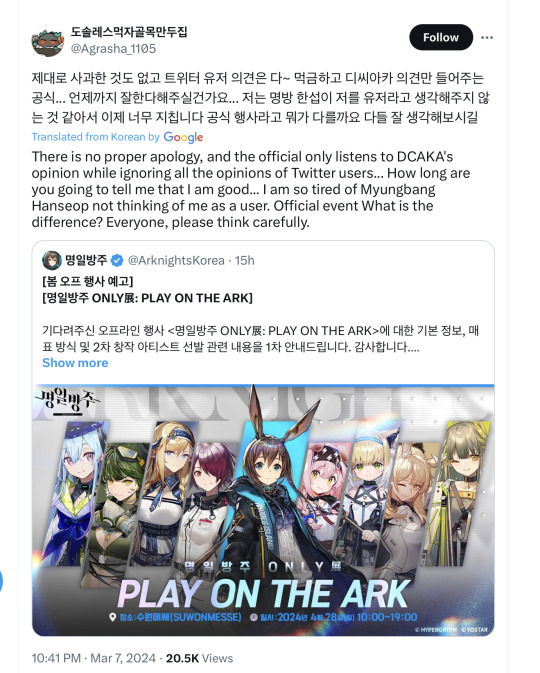
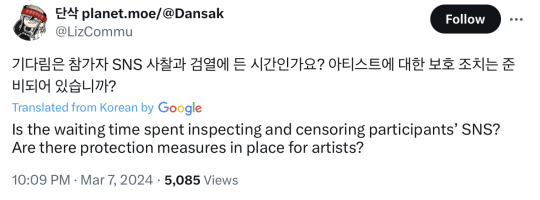
Arknights KR server posts about an official offline event, they have selected various fanartists to participate now. There has been complete radio silence from Hypergryph regarding Yostar (AK Korean server) deleting work created by a female artist and writing a statement calling basic feminism something that “incites division and conflict among users.” Misogynist fans of the game have said to look for popular female fanartists that do not apply to be in this event-it means they are unhappy with the actions taken by Arknights and are therefore also feminists. Be careful should you attend this event, and for everyone playing this game you should seriously consider if you want to keep supporting companies that have no problem listening to incels and acting on their demands.
37 notes
·
View notes
Text
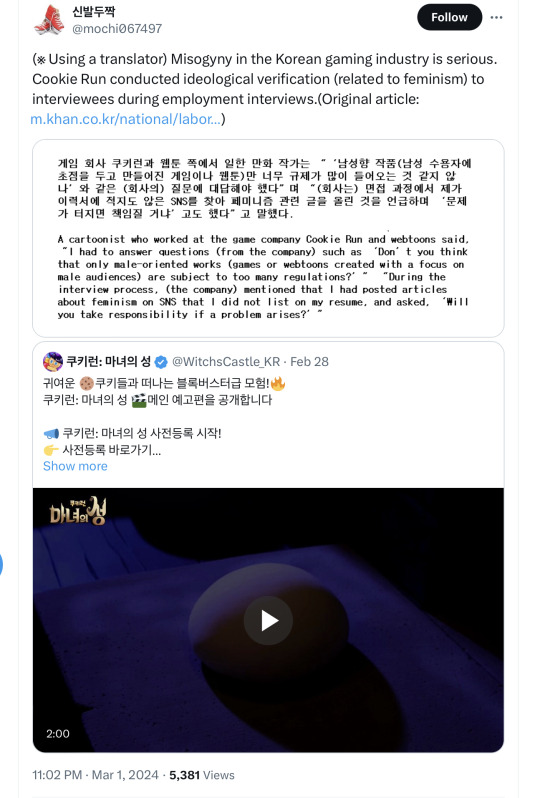
article link
#cookie run#devsisters#devsis#misogyny#feminist ideological verification#korean game industry#korean incel
13 notes
·
View notes
Text
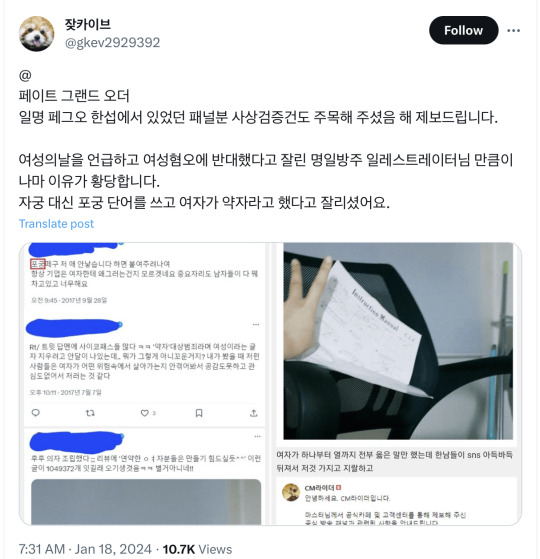
gkev2929392’s post calling attention to the Fate/Grand Order (FGO) Korean server’s feminist ideological verification- full post with screenshots and context that was posted on this blog earlier is here and I’ll also reblog it again
12 notes
·
View notes
Note
Do you think that there is a possibility of Hypergryph splitting from Yostar for global publishing of Arknights and moving it to Gryphline instead? The traditional Chinese server got moved from Long Chen to Gryphline recently, and the new ambience synesthesia concert merch is on the Gryphline store rather than yostar’s. It may just be wishful thinking as yostar and hypergryph both own large shares of each other, but if there is a planned split from yostar would it potentially be a reason why Hypergryph hasn’t made a statement condemning Yostar Korea’s actions? Is there any precedent for publisher changes for a sort of legal clause preventing them from hurting each others’ image prior to the split being announced?
Gryphline is situated in Singapore, having what I guess you could call a “proxy” company for global business in Singapore is something a lot of companies in China have done for a while, increasingly within the past couple of years, for a multitude of reasons. Last time I checked Mihoyo had “Cognosphere” in Singapore, and when you buy gachabux in that game on servers outside China I believe your bill is from Cognosphere. The slave labor fast fashion site Shein has been operating under the Singapore-registered “Roadget Business” which some have speculated makes it easier to list in the USA. Yostar has HQ in Hong Kong which used to be the proxy location but according to this FT article-“Traditionally, Hong Kong was the choice for many such companies, said Kia Meng Loh, a senior partner at Dentons Rodyk. But with Beijing “flexing its muscles” in the semi-autonomous rival finance hub, Singapore is the obvious next choice, he said.” Hypergryph has multiple games coming out in the near future, I believe a regular (non-gacha) 3D anime mobile game and a 3D Arknights spinoff that will have a weapon gacha, and I think another game that’s TBD? They could be rearranging their internal structure due to this expansion if they’ve switched around their Chinese server already, but I’m unsure if this means they will completely split with Yostar who I believe publishes the US, Japanese and Korean servers.
Admittedly I can’t say I’m super well versed with this type of business and therefore it’s harder to really predict what they will do in the future, but I’ve been watching the situation since AK KR posted that notice to see what happens. I don’t have anything against the game itself, if it comes out that somehow their hands are completely tied in the situation or something I’ll post about that as well but I’m not holding my breath. In terms of my read on the situation, I think a huge message has ready been sent to the fans as to whom the company deems most profitable to listen to, regardless of any future handwringing over the situation. I would think between a woman posting extremely basic feminist thoughts on her personal twitter (equal pay etc) and enjoying the woman’s day google doodle years ago, and the Arknights KR/Yostar employee liking extremely violent fanart on the official twitter account and hanging out on extremist, misogynistic chat boards, that the employee would be seen as more of a problem and should have been the one disciplined. In reality, not only was the woman punished by having her work deleted but the official KR account posted that diatribe calling basic feminism a “dividing force” or whatever. This action and the following statement are absolutely not neutral, especially during a time a which violent misogyny has been increasingly ripping through South Korea as a whole but also gacha games specifically. In terms of PR I do think this is something Hypergryph could address, if HG doesn’t want to rock the boat with Yostar so to speak because of some upcoming split, it seems Yostar has already rocked the boat quite a bit with this action to begin with…
in terms of a main developer punishing the publisher, one example I can think of is Fate/Grand Order’s DelightWorks (after the sakura wars fuckup FGO is developed by “Lasengle” now, but when this happened it was DW) changing an in-game reward that FGO’s Korean publisher Netmarble gave out. In terms of them splitting as well, I’m still looking into it 👍 If anyone knows anything else feel free to reply or send me stuff and I’ll post it, sometimes I feel if I wait too long to reply to messages it comes across as rude lol so I’m not getting lost in like thesis tier research


10 notes
·
View notes
Text


users commenting on the irony of Cookie Run posting “our kingdom is a home for everyone” while grilling employees about feminism
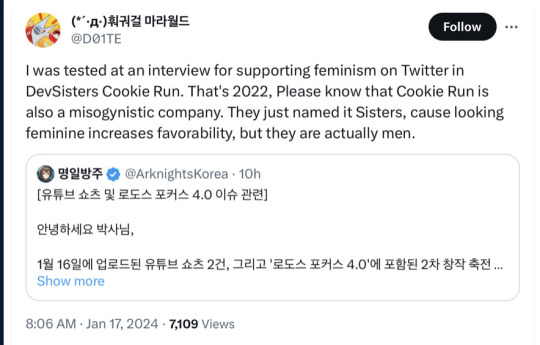
#Cookie run#cookie run kingdom#devsisters#misogyny#feminist ideological verification#pinkwashing#south korea
11 notes
·
View notes
Text
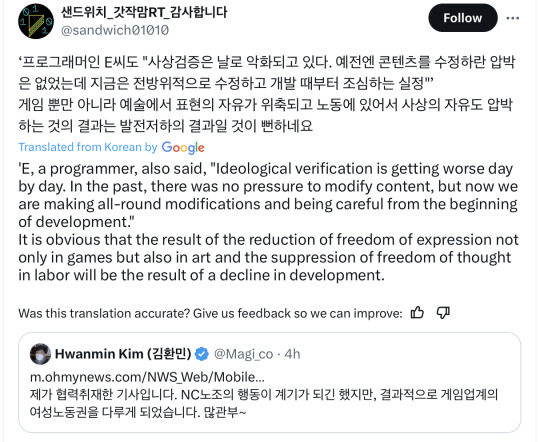


This is an article that reports on the recent “claw hand” (🤏) incident that happened over an NCsoft union poster:


the before & after- you can see they put a star over it as a censor
it also goes into detail about the situation overall for female employee. you can get the gist from MTL, I’ll post it under a cut. just be aware like always sometimes sentence structure is confusing, the pronouns get mixed up, “being feminine” in one of the above quotes should say “feminist”, etc

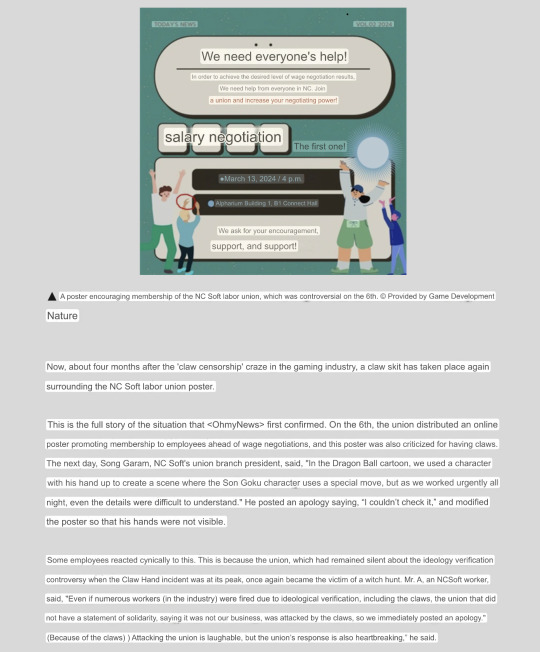
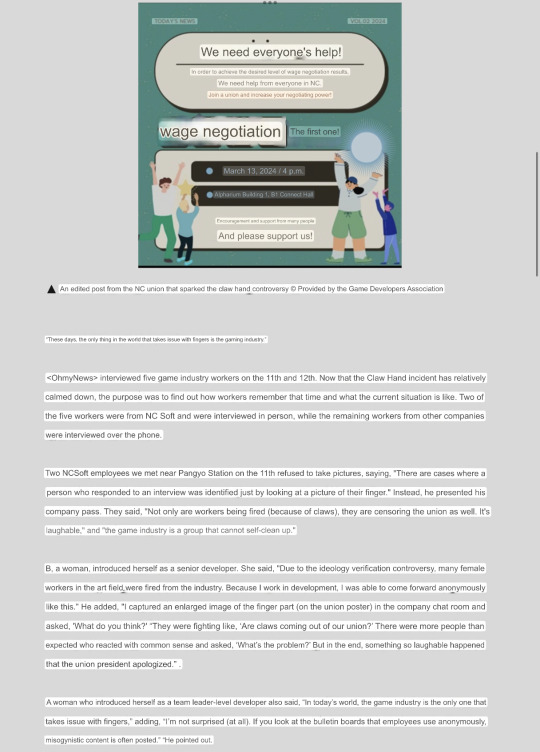

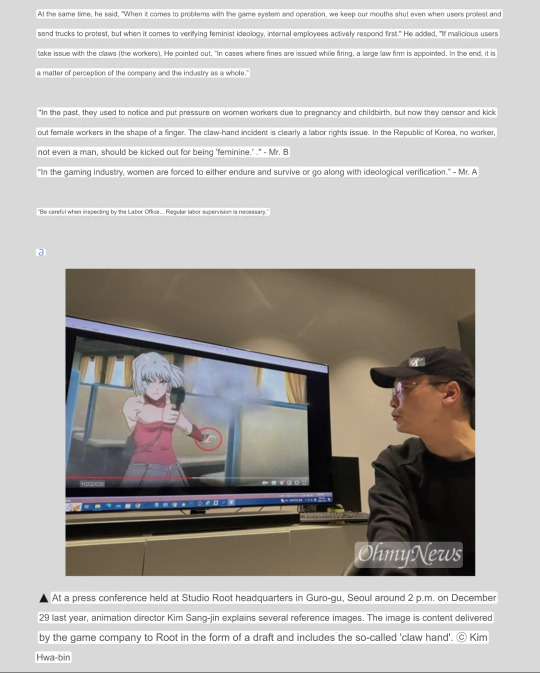


#feminist ideological verification#misogyny#ncsoft#south korea#ideological verification#Korean gaming industry#korean incel#studio ppuri
15 notes
·
View notes
Text
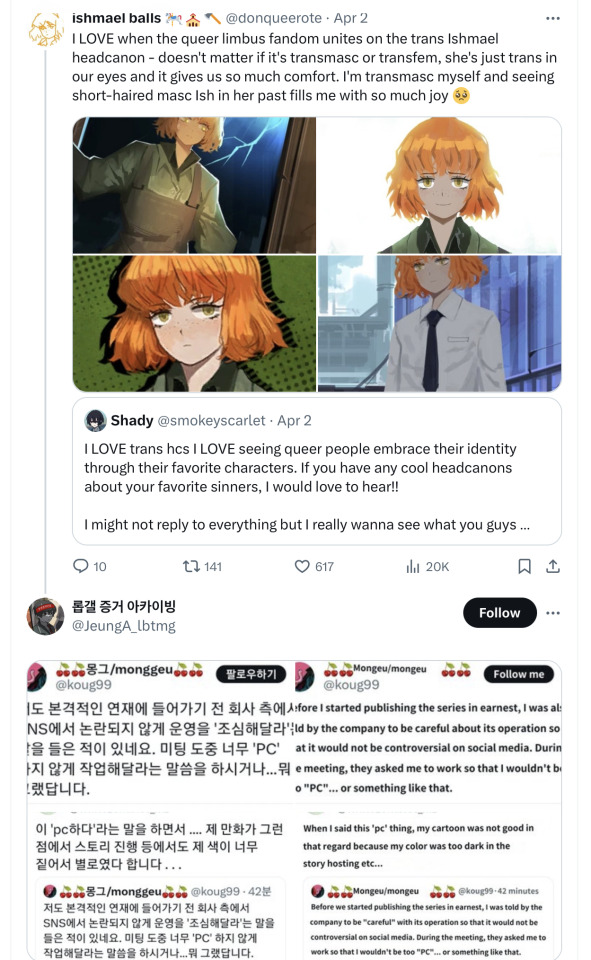

twitter user JeungA-lbtmg asking you (specsthewitched, donqueerote, anyone reading this) to reconsider supporting a game and company that has engaged in the misogynistic act of feminist ideology verification at the behest of incels, told the woman who made the Leviathan comic that there shouldn’t be “PC” (politically correct) things in it, worked her so hard she frequently had suicidal ideation, and adds memes to their game from the incel message board that initially went after the artist Vellmori. The fact that you think this Korean user is a bigot complaining about “PC”/“queer”in the game and can only answer them based on this incorrect assumed fact is very telling. women living in South Korea now who are directly affected by the pervasive, violent misogyny there are still consistently trying to educate fans on the English speaking web about Limbus Company/Project Moon’s role in the recent explosion of feminist ideological verification (ex. incels attacking women for basic feminist ideas and getting them fired from their jobs and worse) and you think this person is some sort of bigot for telling you this? They get slandered as “project moon haters” because you guys think this huge societal issue doesn’t expand beyond a little gacha game you’re addicted to. You can at the very least understand what this person is trying to tell you, so that you can say with your full chest that believing PM is some bastion of queer art (“half of project moon’s inspiration is queer”) and making content is more important to you than the wishes of Korean women (directly affected by project moon’s act of misogyny) to stop engaging with the game. You can do whatever you want of course, it should just be with knowledge of the situation, not thinking that everyone who tries to tell you about this is some bigot.
51 notes
·
View notes
Text
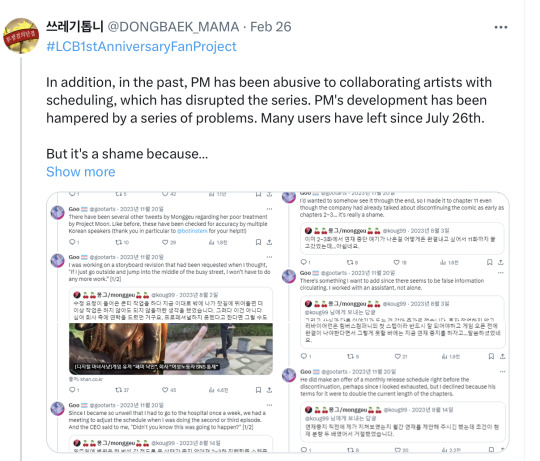
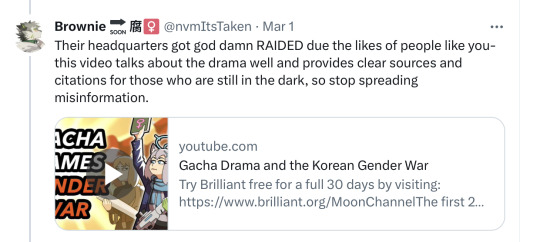
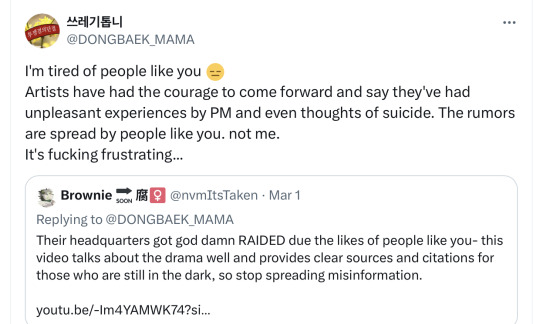
how much misinformation is in this video essay that it’s got people thinking feminists caused a “god damn raid” on project moon’s offices??? So many impressionable people take someone clearly speaking bite-sized bits of “info” on video with stock music and images as the gospel truth. then everyone else has to deal with them constantly butting in to conversations like this with completely incorrect information. because they can link some feature film length video they believe this ends the argument without them having to actually engage in a conversation with their own thoughts and words. They are so eager to passively intake “information” because they want it to be true, yet they cannot even articulate their own argument without linking a video. The fact that the guy apparently shills for fucking NIKKE of all games is genuinely parody-level. not only has that gacha engaged in ideological verification recently, but in the summer there were huge discussions coming from Korean feminists regarding the game’s red-light district looking convention booth. It was even mentioned specifically in an article by an artist who was a victim of ideological verification.




31 notes
·
View notes